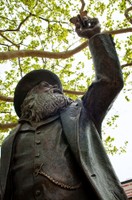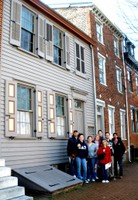There’s reading Whitman. Then there’s breathing Whitman.

An effort under way at Rutgers University–Camden brings the Good Grey Poet off the page and into the world, as graduate English students experience for themselves where Walt Whitman once lived and what locales inspired him to write throughout his career.
During the fall semester, students in two Rutgers–Camden courses not only studied what Whitman penned during his Camden years, 1873-1892, but they’ve also set foot in the house where he finished his days and on the grounds where his body is buried. Some even ventured to Timber Creek, where the famed poet “sun-bathed” in southern New Jersey.

Through funding from the National Endowment for the Humanities, Rutgers–Camden has joined other universities located in cities once inhabited by Whitman – the New York City College of Technology, New York University, and the University of Mary Washington – in the multi-campus digital teaching experiment “Looking for Whitman: The Poetry of Place in the Life and Work of Walt Whitman.”
On http://lookingforwhitman.org, students who are studying Whitman during Leaves of Grass’s first run, Whitman as a Civil War nurse, or Whitman and his last days share their experiences and assignments through open-source software. The site now features an online cultural museum, video of students “finding Whitman” - or the spirit of him - at local sites, and of course, blogs that continue classroom discussion whenever the ideas strike.
“Publishing my work electronically made the whole experience feel like playing with new toys,” says Brian Reece of New Holland, Pa., of his last graduate class at Rutgers–Camden. “I see great potential in using Web 2.0-type tools for academic study. [It] can make scholarship widely accessible and keeps literary study relevant in a digital age.”
Carol Singley, an associate professor of English at Rutgers–Camden, incorporated the program into her “Introduction to Graduate Literary Study” course this fall. For students new to academic scholarship, mandatory blogging, photography, and video wasn’t exactly what students had envisioned for literary study. To relax students into the blogosphere, Singley lifted any grades. But what students wrote in that conversational mode informed their scholarly research, which was held to the same high standards as in traditional courses.
“Not only have we learned about Whitman in new ways, but we’re forging new trails with digital media learning in the humanities,” notes Singley. “The digital component makes everything you do a conversation with others. Students are learning many new ways to communicate intelligently about literature.”
The above is Tara Wood's "cinepoem," a blending of cinema and poetry.
Conversations can only get livelier when the figure being addressed feels real. For Tara Wood, who was enrolled in both classes, Whitman eventually became someone she might run into on the street. She even made Whitman a playlist on her iPod.
“I found myself thinking, ‘Whitman would love this’ or ‘What would Whitman think if he saw this today?’ When you spend three months looking for something everywhere, it’s bound to come alive to you,” she says.
Whitman not only came alive for Wood, and many other students in the project, but so did New Jersey’s history.
In Tyler Hoffman’s class, students’ final projects on Whitman’s legacies will inform the new visitor’s center at the Walt Whitman House in Camden, which became a national literary landmark this November. “The work of this class will become knowledge that is publicly available for future generations of Whitman scholars” adds Hoffman, of both the work on the ground in Camden and on the internet.
Tara Wood, a teacher, is thankful to have had a hand in connecting her own students to Whitman in a language they’ll understand.
“I’m fairly certain if my students are ever going to find Whitman, it’s going to be through a Google search,” Wood remarks. “I’m glad we’ve added to the validity of Whitman online.”
Hoffman and Singley will share their experiences with this innovative project during a roundtable discussion at the Modern Language Association Annual Convention in Philadelphia this month.
All of the students involved in “Looking for Whitman” will convene in Camden for a conference this March.
Media Contact: Cathy K. Donovan
(856) 225-6627
E-mail: catkarm@camden.rutgers.edu